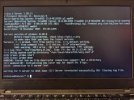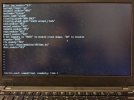I reinstalled FreeBSD and KDE today because of an issue I was having with my clock. Everything seemed to work after installing FreeBSD and Xorg. I was even able to run the TWM window manager after installing Xorg by running
% startx as a regular user. The issue came when I got to the very last step of starting KDE by running % startx. I did everything the same in this install as my previous install, except:- I enabled the ntpdate system service and did not enable the local_unbound system service when installing FreeBSD
- I followed my instructions for installing KDE identically from before, except:
- I did not do steps L7 and L8 because I was told they were unnecessary and instead rebooted the computer right before step L9
- I did not do steps L18-L23 because I couldn't figure them out the first time
- When I first tried launching KDE (step L32), I mistakenly typed
% statrather than% startx, panicked, and ran the command by pressing Enter
% startx.


